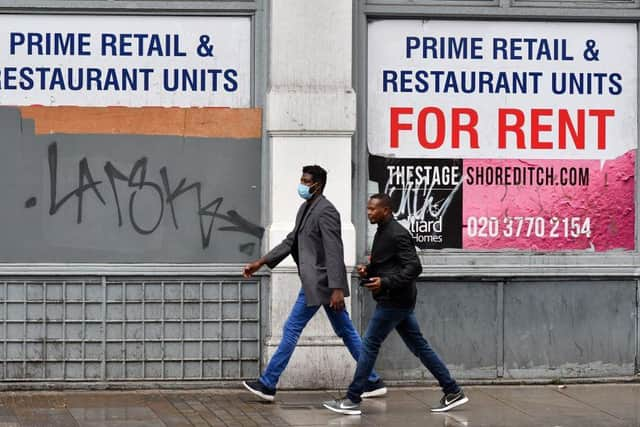Covid-19 unemployment: young black workers hit hardest by rise in job losses during pandemic
and live on Freeview channel 276
Economic think tank The Resolution Foundation (RF) has said that young people - and in particular, young black people - have been the hardest hit by the rise in unemployment during the Covid-19 pandemic.
RF, which is an independent think-tank focused on improving living standards for those on low to middle incomes, said that the young had borne the brunt of the job losses because they disproportionately worked in the sectors that have been worse affected by the crisis, such as retail, hospitality and leisure.
Unemployment rate increasing
Advertisement
Hide AdAdvertisement
Hide AdAnalysis found that existing unemployment gaps between different ethnic groups, particularly among education-leavers, had widened.
Before the Covid-19 pandemic hit, the report states that “one in four (25 per cent) economically active black 16 - 24 year olds were unemployed, compared to one in 10 (10 per cent) of their white counterparts”.
When the pandemic hit, “the unemployment rate rose to 34 per cent (a nine percentage point increase) among black young people and to a 13 per cent (a two point rise) among white young people”.
According to the latest figures from the Office for National Statistics (ONS), the most recent unemployment rate (for November to January) was five per cent, which is the highest figure for five years and translates to 1.7 million people being unemployed.


Youth unemployment
Advertisement
Hide AdAdvertisement
Hide AdThe report from RF states that “youth unemployment rose faster between spring and autumn 2020 than at any point since the financial crisis” and that young people have been “more likely than their middle aged counterparts to have lost working hours, experienced lower pay, been put on furlough or have lost their jobs”.
“In fact, young workers (those aged 16-24) have accounted for nearly two-thirds of the total fall in payrolled employment that occurred in the year to February,” the report says.
It continues: “This has exacerbated pre-existing intergenerational inequalities, wherein during the decade before the pandemic, younger people had experienced lower rates of pay growth and higher rates of working in the country’s lowest paid sectors (retail, hospitality, and arts and leisure), compared to their predecessors while the same age.”
‘Young people have sacrificed their livelihoods’
Kathleen Henehan, Senior Research Analyst at Resolution Foundation, said: “The furlough scheme has done a fantastic job of minimising job losses amidst unprecedented shutdowns of our country.
Advertisement
Hide AdAdvertisement
Hide Ad“But young people have still experienced a sharp rise in unemployment during the Covid-19 crisis - with recent education leavers and young black people being hardest hit.
“Young people have sacrificed their livelihoods in order to save the lives of others from Covid-19, and putting their careers back on track must be a priority for the Government in the months and years ahead.”
What financial help is available from the Government?
If you’ve lost your job, you might be able to claim New Style Jobseeker’s Allowance (JSA) or Universal Credit, both of which can be done via the Government website.
You can claim New Style JSA if:
- You usually work less than 16 hours a week
- You’re under State Pension age
- You have made enough National Insurance contributions over the last two to three years
Advertisement
Hide AdAdvertisement
Hide AdYour savings and partner’s income will not affect how much you get, and you might be able to claim New Style JSA at the same time as Universal Credit.
You could get Universal Credit if:
- You have less than £16,000 in savings
- You or your partner is under State Pension age
If you’re already getting tax credits, they will stop when you or your partner applies for Universal Credit. Under certain circumstances, Universal Credit can include additional amounts for things like rent or the costs of raising children.
You can also use the Government “Find a Job” tool on its website, which allows users to find full or part time shops in England, Scotland and Wales and also apply for them.